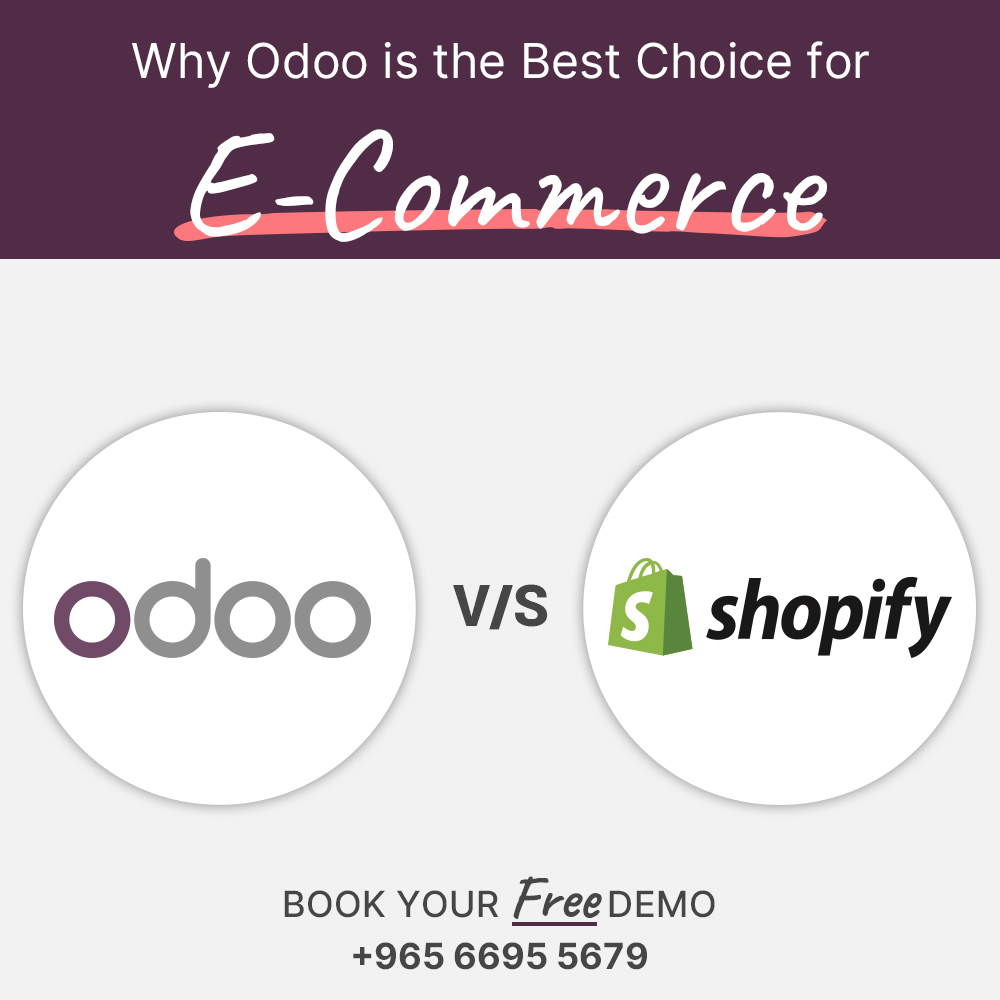Odoo Website vs. Shopify Website: The Ultimate Guide to Choosing the Best Platform for Your E-Commerce Business
In the fast-paced world of e-commerce, selecting the right website platform is crucial to success. While many businesses immediately turn to Shopify for its user-friendly interface and market popularity, Odoo Website is becoming the go-to choice for growing companies looking for flexibility, scalability, and integrated business solutions. This blog breaks down the unique benefits of both platforms and explains why Odoo Website is the best choice for e-commerce in today’s competitive environment.
1. Integrated Business Solutions
- Odoo Website is part of the Odoo ecosystem, offering a suite of applications like CRM, Inventory, Accounting, and Sales that seamlessly integrate with your e-commerce platform. This means you manage your entire business within one platform, which is essential for scaling your business and keeping all your operations under one roof.
- Shopify, on the other hand, is a standalone platform focusing primarily on e-commerce. While it can integrate with some third-party apps for added functionality, these are often paid add-ons that can increase costs and create additional points of failure.
2. Full Customization and Flexibility
- Odoo allows for unlimited customization. From creating tailored checkout processes to adding custom fields on product pages, Odoo provides complete flexibility, allowing your website to adapt to your unique needs as your business grows.
- Shopify is designed for simplicity, which limits customization options. While Shopify has a marketplace of themes and apps, modifying them often requires hiring developers, especially when advanced customization is needed.
3. No Hidden Fees or App Dependency
- Odoo Website includes a vast array of features as part of its core platform, significantly reducing reliance on third-party applications. This approach not only reduces extra costs but also minimizes the risk of incompatibilities and data integration issues.
- With Shopify, many essential e-commerce features (such as advanced reporting, shipping integrations, and even certain payment gateways) require third-party apps, often with extra monthly fees. These costs add up quickly, impacting your bottom line.
4. Better Control Over SEO and Content Marketing
- Odoo Website comes with powerful SEO tools right out of the box. With integrated marketing and blogging modules, Odoo allows businesses to manage content, run SEO campaigns, and track metrics in a centralized system. For companies prioritizing content marketing, Odoo is a comprehensive solution that supports growth-driven SEO strategies.
- Shopify also offers SEO features, but its SEO limitations can hinder businesses needing advanced customization. With Shopify’s focus primarily on product and catalog management, content-heavy websites may find themselves limited.
5. Scalability for Growing Businesses
- Odoo’s modular structure makes it highly scalable. Businesses can start with core e-commerce functionalities and add applications like Marketing Automation, HR, and Project Management as they grow. This flexibility is ideal for companies that want to evolve over time without switching platforms or paying for unnecessary features upfront.
- Shopify has its limits, especially as businesses expand into areas like B2B sales, advanced inventory management, or multi-channel marketing. Shopify Plus can support high-traffic websites, but the monthly cost can be prohibitive, and even with that, users are still reliant on third-party apps to cover all business needs.
6. Ownership and Data Control
- Odoo provides better control over data, allowing companies to host their website on their own servers or via Odoo’s cloud. Businesses retain ownership of their data, which is vital for data security, privacy, and analysis.
- With Shopify, data is hosted on Shopify’s servers, meaning your data is part of their ecosystem. Should you ever want to migrate your website away from Shopify, data transfer can be challenging and may incur additional fees, limiting control over your business’s information.
7. Cost-Effectiveness for Growing Enterprises
- Odoo is an affordable solution with a modular pricing structure, making it a cost-effective choice, especially for businesses looking to scale. Since it includes a variety of business applications within its ecosystem, companies avoid the need to purchase multiple third-party applications, keeping costs low.
- Shopify charges not only a monthly fee but also transaction fees unless you use their payment gateway. For small businesses, these fees may not seem high, but as businesses grow, these cumulative costs can significantly impact profits.
8. In-Depth Analytics and Reporting
- Odoo Website is integrated with Odoo’s powerful Analytics and Reporting tools, which allow users to monitor KPIs, inventory, sales forecasts, and more. Having this data directly in the system provides better insight and enables businesses to make data-driven decisions on the fly.
- Shopify’s reporting features are mostly limited to higher-priced plans. For detailed analytics, Shopify users often need to rely on additional apps or integrations with other analytics tools.
9. B2B and Multi-Channel Capabilities
- Odoo is particularly well-suited for B2B e-commerce operations and companies with multi-channel needs. With features like sales and inventory management, a customer portal, and B2B-specific functionalities like price lists and bulk ordering, Odoo is highly adaptable for complex sales operations.
- While Shopify is well-regarded for B2C, its B2B capabilities are limited. Shopify Plus does offer more B2B functionality but at a significant cost, and it still falls short of the in-depth B2B features offered by Odoo.
10. Customizable Checkout Process
- Odoo offers full control over the checkout experience, allowing businesses to create a streamlined and custom flow that best suits their target audience. This flexibility can lead to a better customer experience and higher conversion rates.
- Shopify’s checkout experience is limited to their standard process unless using Shopify Plus, which allows minimal customization. For companies needing a tailored checkout to optimize conversions, Odoo is a clear winner.
Conclusion: Why Odoo is the Best Choice for E-Commerce
Choosing the right e-commerce platform is essential for long-term business growth and success. Odoo Website is an all-in-one solution that adapts to every phase of business, allowing companies to expand and customize without sacrificing control or functionality. With its robust integration capabilities, seamless business management features, and high scalability, Odoo stands out as the ultimate platform for e-commerce, especially for those looking to scale and optimize costs in the process.
While Shopify is a popular platform with a focus on ease of use, it often leads to additional costs, limited customizations, and reliance on third-party applications. For businesses seeking an adaptable, integrated solution that supports e-commerce and beyond, Odoo Website is the superior choice, delivering unmatched value and flexibility as a business grows.


